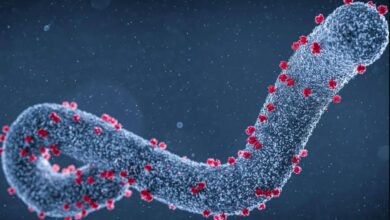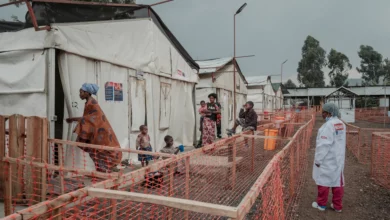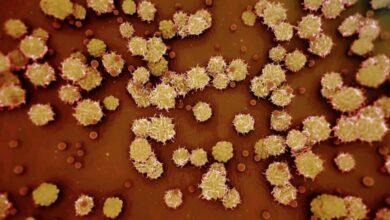
(CNN) – Monkeypox is spreading in the United States and around the world. There are at least 16,000 infections documented in over 40 countries, and the World Health Organization has declared it a public health emergency of international concern. The US Centers for Disease Control and Prevention is reporting more than 3,000 infections, just two months after monkeypox was first detected in this outbreak.
How much should people worry about contracting monkeypox? Should everyone be trying to get the vaccine? Who are the groups most at risk, and what actions should they take? How exactly is monkeypox spread and how can people prevent from trying to get it? What are common symptoms to look out for?
To help us better understand monkeypox and the risk it poses, I spoke with CNN Medical Analyst Dr. Leana Wen, an emergency physician and professor of health policy and management at the George Washington University Milken Institute School of Public Health. She is also author of “Lifelines: A Doctor’s Journey in the Fight for Public Health.”
CNN: How is monkeypox spread? Is it as transmissible as Covid-19, another disease that we know very well by now?
Dr. Leana Wen: Monkeypox is not spread like Covid-19. As we know by now, Covid-19 is highly transmissible and can be spread through microscopic aerosols. That means you could be infected by someone who you’re having a casual conversation with or even someone who happens to be in the same conference room or restaurant as you.
Monkeypox is primarily spread through prolonged, direct, skin-to-skin contact. Most cases thus far have been linked to sexual activity though this is not considered a sexually transmitted infection. Rather, individuals can spread monkeypox through intimate contact, such as kissing, hugging, cuddling and sexual intercourse.
Individuals who have lesions can also shed virus onto bedsheets, towels and other linens that can spread the virus to others. This is why people with active monkeypox lesions are instructed not to share potentially contaminated items like linens, towels, drinking glasses and eating utensils with others.
CNN: What kinds of symptoms do patients with monkeypox have?
Wen: People who contract monkeypox often first start developing fever, headache, muscles aches and overall fatigue — similar to many other viral illnesses. Many people also have lymph node swelling. They then develop a rash that progresses into blisters, pimples or sores. The lesions can be all over the body or only in one part. It could be localized to just the anal or genital area, on the face, inside the mouth, or any other part of the body.
A large study recently published in the New England Journal of Medicine examined 528 infections across 43 sites in 16 countries. It found that the most common symptoms are fever, tiredness, muscle aches and lymph node swelling. Nearly all had a rash with blisters, though some individuals only had one lesion while others had several or more. Some people only had sores inside their mouth or in their anal or genital areas.
Clinicians seeing patients with a fever and new rash should have a low threshold for testing for monkeypox, especially if the patient is in a high-risk group for contracting monkeypox. Importantly, the recent study also found that 29% of people diagnosed with monkeypox had a sexually transmitted infection. To me, this means that just because a patient is diagnosed with one thing doesn’t mean they can’t have another, too, and patients in high-risk groups who have new lesions need to get tested to rule out monkeypox.
CNN: What started monkeypox, and how widespread is it in the United States?
Wen: Monkeypox is a virus that is in the same family as the smallpox virus. It was first discovered in 1958 in monkeys, hence the name, though its usual animal hosts are rodents and other small mammals. It first appeared in humans in 1970 in east Africa. It has been endemic in countries in sub-Saharan Africa, with outbreaks sometimes occurring when infected travelers bring back the disease to their home countries. There was a big outbreak in the United States in 2003 due to imported rodents.
This outbreak is much larger. More than 3,000 people have been infected in the United States thus far, with infections seen in almost every state. The CDC has an updated map of cases and infections here.
CNN: Who are the individuals in the high-risk groups for contracting monkeypox?
Wen: Thus far, monkeypox has predominantly affected gay, bisexual and other men who have sex with men. In the New England Journal of Medicine international case series, 98% of people with monkeypox were gay or bisexual, and the transmission was linked to sexual activity in 95% of the cases. The US Centers for Disease Control and Prevention has said that the “vast majority” of cases in the United States are in men who have sex with men, with a median age of 36.
Currently individuals at high risk are men who have sex with men and who have sex with multiple or anonymous partners. There are also reports in the United States of some women and two children who have contracted monkeypox, who are all believed to be direct contacts of men who have sex with men.
CNN: Has anyone died from monkeypox?
Wen: Monkeypox usually has a fatality rate of 3% to 6%, according to the World Health Organization. Thankfully, no one has died from monkeypox in the United States yet, but this is a painful disease that can and does lead to severe illness and death. Those particularly vulnerable include pregnant women, young children and immunocompromised people.
CNN: How much should people worry about monkeypox?
Wen: Because of the way that monkeypox is spread, it is not yet a concern for most Americans. However, individuals who are gay, bisexual and other men who have sex with men, who have intimate contact with multiple or anonymous people, are at high risk.
These individuals should immediately seek testing if they have a new rash or sore, and they should avoid close physical contact in the meantime. People who wish to reduce their risk should avoid crowded clubs, raves, sex parties and other places where there is prolonged skin-to-skin or face-to-face contact with many people who may be wearing less clothing.
CNN: Should everyone try to get the monkeypox vaccine?
Wen: No. First of all, the monkeypox vaccine is extremely limited right now. About 300,000 doses of the two-dose vaccine have been delivered thus far, much less than the 1.5 million people the CDC says are eligible.
Those who should definitely get the vaccine are those with known exposure to someone with monkeypox. If given within four days of exposure, the vaccine can prevent someone from developing monkeypox. If given within two weeks, it lessens the likelihood of progression to severe illness.
Soon, I hope there will be enough vaccine so that people in high-risk groups are able to access it. But given the way that monkeypox is spread, most Americans are not likely to contract it, and a mass vaccination campaign targeting the general population is probably not going to be recommended any time soon.
CNN: Is monkeypox going to be yet another virus that will be endemic in the United States?
Wen: I really hope not. It is still possible to contain monkeypox through testing and vaccination. I hope that the WHO’s declaration of a global health emergency will spur more countries, including ours, to put every effort to try to prevent monkeypox from taking hold and becoming endemic here.




